| Barbary Wars |
| Series of conflicts against North African states |
| Time Period | First War: May 10, 1801 – June 10, 1805; Second War: June 17 – 19, 1815 |
| Participants | United States, Sweden, Kingdom of Sicily vs Barbary States (Tunis, Algiers, Tripoli) and Morocco |
| Primary Cause | Piracy and tribute demands by Barbary pirates on American merchant vessels |

The Barbary Wars were two conflicts fought between the United States and the Barbary States of North Africa (Tripoli, Algiers, Tunis, and Morocco) in the early 19th century over piracy against American merchant ships in the Mediterranean. Here is the story of these wars:
First Barbary War (1801-1805)
Background
After the American Revolutionary War, the U.S. lacked the protection of the British Royal Navy and was vulnerable to the Barbary pirates who routinely captured merchant ships and held crews for ransom. The U.S. had previously paid tributes or ransoms to the Barbary States, but these payments kept increasing.
Outbreak of War
In 1801, Tripoli’s pasha demanded $225,000 from the new president, Thomas Jefferson. Refusing to pay further tribute, Jefferson sent a naval squadron led by Commodores Richard Dale and Edward Preble to blockade Tripoli and protect American ships.
Key Events
- In 1803, the USS Philadelphia ran aground near Tripoli and was captured, with its crew held for ransom. Lieutenant Stephen Decatur led a daring raid to burn the captured ship.
- In 1804, Lieutenant Decatur again distinguished himself by leading a night attack into Tripoli harbor to burn the pirate fleet using the explosive ship Intrepid.
- After a naval blockade and attacks on Tripoli by Decatur and others, the pasha agreed to make peace in 1805 without further tribute payments.
Second Barbary War (1815)
Background
Despite the 1805 peace, Algiers soon broke the treaty by seizing American ships again. The U.S. had been preoccupied with the War of 1812 against Britain.
Decisive American Victory
In 1815, President Madison sent naval squadrons led by Decatur and William Bainbridge to the Mediterranean. After capturing Algerian ships and bombarding coastal cities, Decatur forced Algiers, Tunis, and Tripoli to agree to cease payment of any further tribute.
Aftermath
The 1815 victories by Decatur and Bainbridge marked the end of the threat of Barbary piracy against American ships in the Mediterranean. European powers soon followed suit, using naval force to compel the Barbary States to halt piracy against their ships as well.The Barbary Wars allowed the young U.S. Navy and Marines to gain crucial experience in naval warfare and overseas operations. It demonstrated America’s ability to protect its interests through “gunboat diplomacy” and helped establish the U.S. as a naval power in the Mediterranean.
The key battles of the First Barbary War
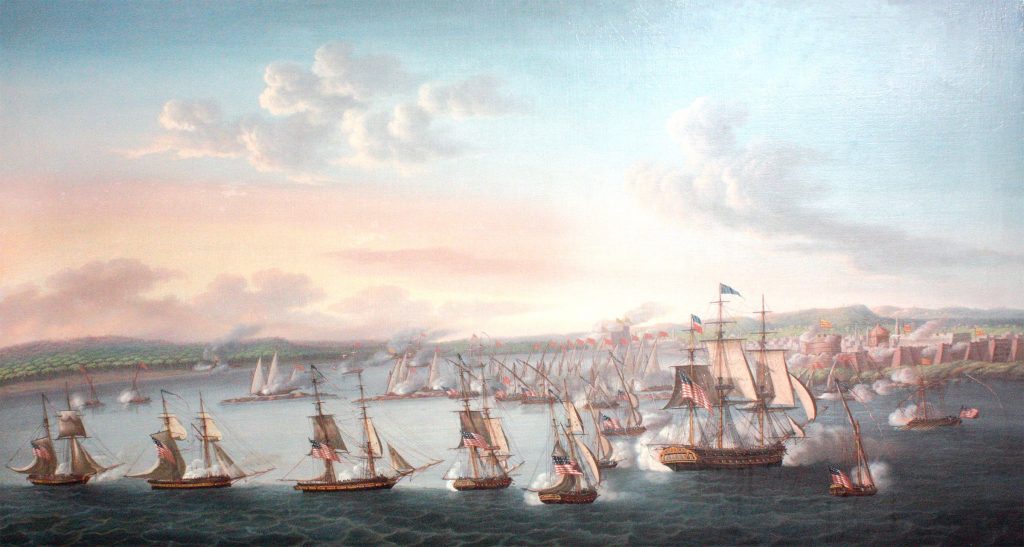
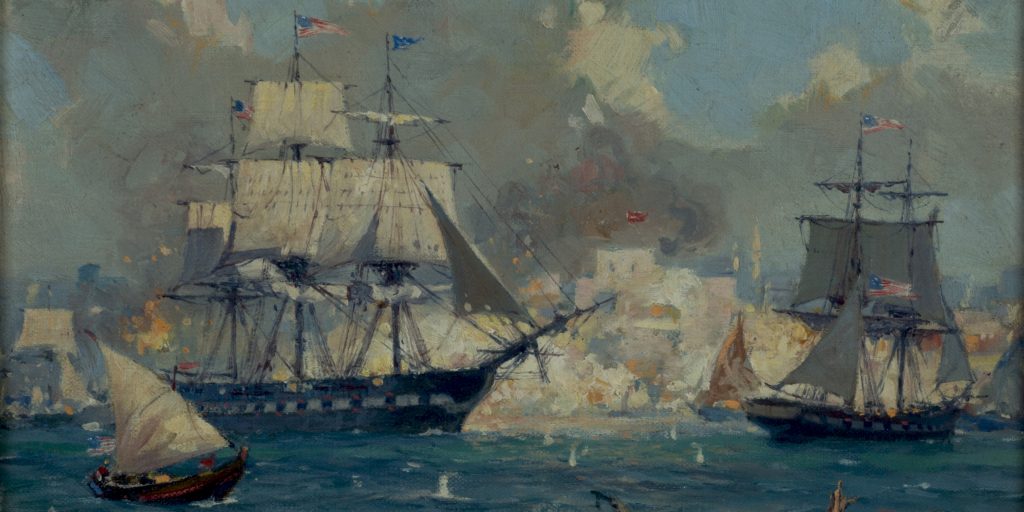
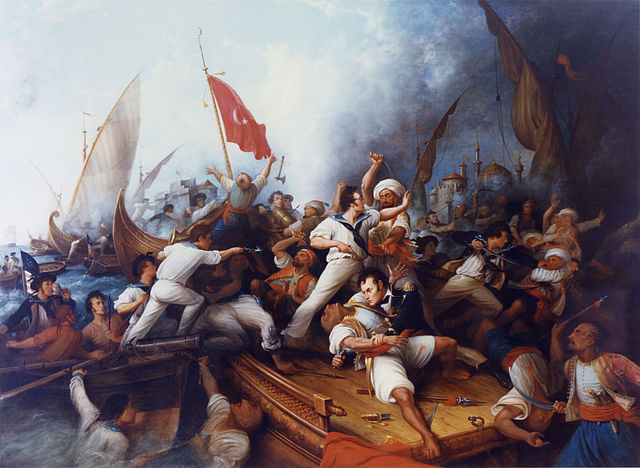
Some of the key battles and engagements of the First Barbary War (1801-1805) between the United States and the Barbary States were:
- Battle of Tripoli Harbor (August 1801)
In one of the first actions of the war, the USS Enterprise under Lieutenant Andrew Sterret defeated and captured the 14-gun Tripolitan corsair Tripoli. This early American naval victory boosted morale. - Burning of the USS Philadelphia (February 1804)
After the USS Philadelphia ran aground and was captured by Tripoli, Lieutenant Stephen Decatur led a daring night raid into Tripoli harbor to burn the captured ship to prevent its use by the Tripolitans. This made Decatur a national hero. - Battle of Tripoli Harbor (August 1804)
In this engagement, Decatur again distinguished himself by leading a nighttime attack into Tripoli harbor, boarding and capturing several Tripolitan gunboats and rescuing American prisoners. - Capture of Derna (April-May 1805)
In one of the war’s most audacious actions, a force led by William Eaton and the deposed Pasha Hamet Karamanli marched across the Libyan Desert and captured the city of Derna from the Tripolitans. This helped compel Tripoli to accept peace. - Second Battle of Tripoli Harbor (1805)
In the final major battle, Commodores John Rodgers and Stephen Decatur led American naval forces in bombarding Tripoli’s harbor defenses and gunboats. This further pressured Tripoli into agreeing to a peace treaty.
While not large-scale fleet engagements, these key battles involving daring raids, coastal assaults, and naval bombardments allowed the outnumbered American naval forces to gain the upper hand against the Barbary pirates and force Tripoli to accept peace without further payment of tribute.
How did the Battle of Derna contribute to the outcome of the First Barbary War
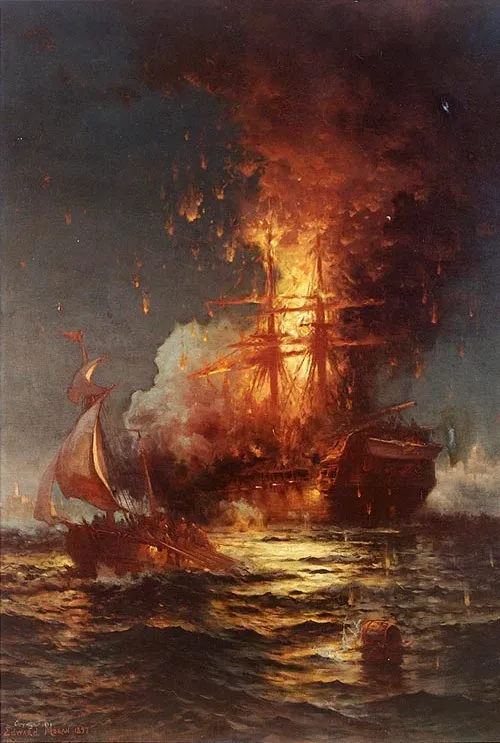
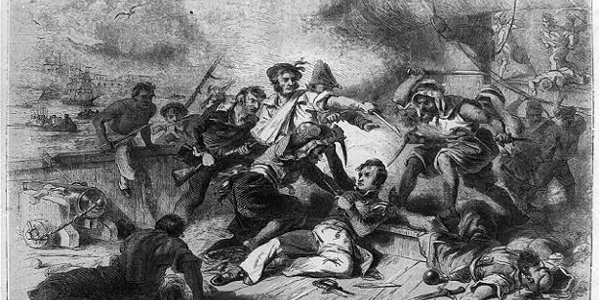
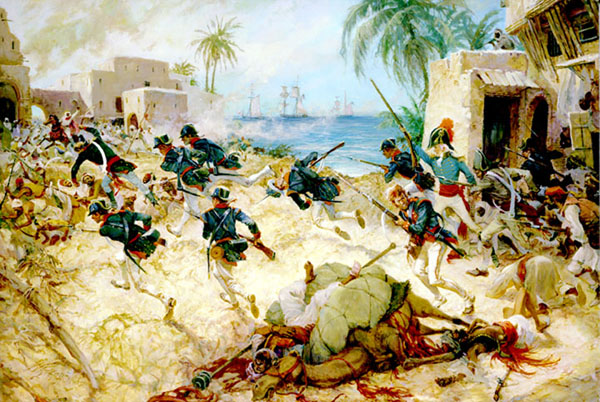
The Battle of Derna in April-May 1805 played a pivotal role in contributing to the eventual outcome and American victory in the First Barbary War against Tripoli. Here’s how the Battle of Derna impacted the war:
- It was a daring overland attack deep into Tripolitan territory, demonstrating American resolve and capabilities. Former U.S. consul William Eaton led a force of 400 Arab and Greek mercenaries along with the deposed Pasha Hamet Karamanli on a 600-mile march across the Libyan Desert to attack Derna, Tripoli’s second largest city.
- Eaton’s land forces coordinated with American naval forces under Captain Isaac Hull, who provided crucial naval gunfire support during the attack on Derna’s defenses. This combined operation showcased effective joint operations between the army and navy.
- The capture of Derna on April 27, 1805 was a major psychological and strategic blow to the Pasha of Tripoli, Yusuf Karamanli. It threatened the loss of his control over Tripoli itself if Eaton continued advancing.
- Yusuf Karamanli’s brother Hamet, who accompanied Eaton, had legitimacy as the previously deposed ruler, posing a internal threat to Yusuf’s reign if he gained more power.
- The victory at Derna combined with the blockade of Tripoli put immense pressure on the Pasha to negotiate peace. Just over a month later, he agreed to the Treaty of Tripoli, releasing American prisoners and promising no more tributes.
While not the largest battle, Derna demonstrated American resolve and capabilities through Eaton’s bold overland campaign supported by the navy. Its success directly compelled the Pasha to accept peace on favorable terms for the U.S., ending the First Barbary War. It was a major contributing factor to the American diplomatic victory.
How did the Barbary Wars influence U.S. foreign policy in the Mediterranean
The Barbary Wars had a significant influence on shaping early U.S. foreign policy in the Mediterranean region and beyond. According to the provided sources, some of the key impacts were:
- Assertion of U.S. Power and Sovereignty
The wars demonstrated the young United States’ willingness to use military force to protect its maritime trade interests and assert its sovereignty, even against the Barbary states which were nominally under Ottoman control. This set a precedent for the U.S. to project power abroad to secure its commercial and strategic objectives. - Establishment of Naval Power Projection Capabilities
Building up the small U.S. Navy to wage the Barbary Wars allowed America to develop blue-water naval forces capable of operating in the Mediterranean. This enabled power projection and influence in that region going forward. - Rejection of Tribute System
By refusing to continue paying tribute to the Barbary states after the First Barbary War, the U.S. took a stand against such extortion demands. This principle influenced later policies against appeasing threats to American interests. - Interventionism to Secure Free Trade
The wars reflected the U.S. commitment to intervening militarily if necessary to secure free trade and open shipping lanes, a policy that continued into the 19th and 20th centuries. - Precedent for Preemptive Military Action
The Second Barbary War in 1815 saw the U.S. take preemptive military action against Algiers before a formal declaration of war, setting an early precedent for such policies. - Demonstration of Global Ambitions
By projecting force across the Atlantic so soon after independence, the Barbary Wars signaled the United States’ intention to be a major international player capable of defending its interests globally.
While limited conflicts, the Barbary Wars allowed the young United States to flex its military muscles, reject the tributary system, and establish core tenets of its foreign policy like interventionism, free trade, and preemptive force projection that endured for centuries. They marked America’s arrival as a maritime power in the Mediterranean.
Additional information
Here are some additional key details about the Barbary Wars:
First Barbary War (1801-1805):
- It began after the Pasha of Tripoli demanded $225,000 in tribute from President Thomas Jefferson, who refused to pay and sent a naval squadron led by Commodores Richard Dale and Edward Preble to blockade Tripoli instead.
- One of the most famous incidents was the burning of the captured USS Philadelphia in Tripoli harbor in 1804 by a daring raid led by Lt. Stephen Decatur to prevent its use by the Tripolitans.
- Another key event was the overland march across the Libyan desert by William Eaton and a mercenary force that captured the city of Derna in 1805, putting pressure on Tripoli to agree to peace.
- The war ended with the Treaty of Tripoli in 1805, where the U.S. agreed to pay a ransom for American prisoners but no more annual tribute.
Second Barbary War (1815):
- It began after the Barbary states, emboldened by the War of 1812 between the U.S. and Britain, resumed attacks on American merchant ships.
- Under President Madison, Commodores Stephen Decatur and William Bainbridge led squadrons that decisively defeated the Algerian naval forces.
- After capturing Algerian ships and bombarding coastal cities, Decatur forced Algiers, Tunis and Tripoli to agree to cease demanding tribute from the U.S. in 1815.
- This effectively ended the threat of Barbary piracy against American ships in the Mediterranean.
The Barbary Wars allowed the young U.S. Navy to gain crucial experience in naval warfare and overseas operations. It demonstrated America’s ability and willingness to use military force to protect its maritime trade interests against the Barbary pirates.